During the fifteen years’ reign of her husband Helena is known to us only for the unscrupulousness with which, in collusion with the head chamberlain Basil, she sold offices of state to the highest bidders. The interest passes to the new and singular types of Empresses who now enter the chronicles. The first is the most pathetic and remarkable figure in the whole strange gallery of the Byzantine Empresses. Helena and Constantine had a son named Romanus, and the elder Romanus, who was most assiduous at making royal matches for his descendants, had decided to marry the boy in good time. It seems not unlikely that, in his last year of life, he realized the unscrupulousness of his sons, and entertained a tardy concern about his oath. At that time the kingdom of Italy was ruled by Hugh, a violent and half-barbaric monarch, whose conjugal arrangements were calculated to furnish a rich supply of royal alliances. Romanus sent an envoy to ask the hand of one of his natural daughters, and the little Bertha, a beautiful child of tender years, was conducted to Constantinople by the Bishop of Parma and married to the boy Emperor. Romanus was five years old, and it is not likely that Bertha, or Eudocia, as she was now named, was older than he. What type of woman the little princess, offspring of a wild Teuton and his concubine, would have made, we shall never know, for she died five years afterwards. The chroniclers are careful to add that she died a virgin.
The young prince was allowed to grow, and develop his vices, for a few years, before contracting a second marriage. It seems to have been in his eighteenth year140 that he took a second wife, and his choice illustrates at once the supineness of his father, the selfishness of his mother, and the unrestrained passion of the son. He married Anastaso, the daughter of a tavern-keeper named Crateros. We have seen so many types of Empresses ascend the throne that it might cause us little surprise to find a woman passing from the counter of a wine-shop to the palace, but there is grave suspicion that Theophano—the name substituted for Anastaso—was base in more than the genealogical sense of the word. She is accused of poisoning her father-in-law and her first husband, and she certainly led the assassins to the chamber of her second husband. Whatever allowance we make for the prejudice against her humble birth, authentic facts in her story show that she was licentious and criminal.
We do not know how the son of a highly cultivated Emperor made the acquaintance of a tavern-girl. It is clear that she was a young woman of singular beauty—“a kind of miracle of nature,” Zonaras says—and most graceful figure, and I would conjecture that some courtier among the disreputable followers of the young prince brought her to his notice. There may have been a “beauty show,” and the publican may have boldly pressed the merits of his daughter, but some attention was generally paid to birth in these matrimonial contests. A tavern-woman was still held to be equivalent to a prostitute or an actress. It is useless to speculate. Constantine idly acquiesced, and the beautiful Theophano passed from the sordid scenes of a little wine-shop to the wonderful splendours of the palace. Courtly writers afterwards discovered that there was royal blood in her veins. The only serious clue we have to her origin is that she came from Laconia, and we may regard her as a common type of Greek.
It is calculated that the marriage took place about the end of the year 956. For three years no events occur that enable us to penetrate the secluded life of the palace,141 though the subsequent events suggest that Helena and her daughters were disdainful of the vulgar beauty and were met with a virulent hatred. At the end of three years (August or September 959) Constantine died, and the ampler chronicles tell a circumstantial story of his being poisoned by his son Romanus and Theophano. A poison was, it is said, put in his physic. Either by accident or from suspicion he spilled most of the contents of the cup and escaped death. But his health was gravely impaired; he went to visit the monasteries of Mount Olympus, fell dangerously ill there—the chronicler says that perhaps more poison was administered—and was brought back to the palace to die.
We must regard this charge of poisoning as probably a construction put on his illness by the officials or people of Constantinople. It may or may not be true. We have no right to conclude at once that it is an historical fact, but it seems to me that some recent historians have just as little right to reject it as “improbable.” Romanus was a licentious and unscrupulous man, carrying his father’s amiable weakness for wine to the pitch of debauch and ruining his constitution by vice. Theophano, we shall see, was capable of murder, and her ambition would most certainly lead her to wish the older imperial family out of the way. On the other hand, there would be a prejudice against her in Constantinople, and in the mind of later writers, and we must leave this first charge against her what it is in the chronicles—a suspicion.
Her next step was to get rid of the sisters of Romanus. Helena and her five daughters still lived in the palace, or in one out of the great cluster of palaces. There were now at least eight palaces, connected by superb colonnades or separated by choice gardens and terraces, in the vast imperial domain between the Hippodrome and the Sea of Marmora; there were, in addition, several palaces on the Asiatic coast; and the palace at Blachernæ, in the cool, hilly district to the north, had in turn become a vast cluster of palaces, chapels, colonnades and terraced gardens. The mother and sisters of Romanus could therefore find ample hospitality without being compelled to witness the daily dissipation of the Emperor, his drunken banquets and his troops of lascivious actors and women, but they frowned on the kind of Court over which Theophano presided, and she persuaded her husband to remove them. He bade his five sisters adopt the monastic life. Theophano now had two sons and a daughter, and would feel safer if their royal aunts were prevented from making aristocratic marriages. The young women were, however, not at all disposed to embrace a religious life and there were furious scenes in the palace. They were removed to the monastery into which the palace of Theodora’s minister, Theoclistus, had been converted, near the Hippodrome, but they seem still to have intrigued, and were separated and transferred to other monasteries.
Romanus was not cruel or malignant. His temper was to live and let live, provided that no check was placed on his imperial pleasures. He merely smiled, therefore, when he heard that, in their convents, his sisters refused to exchange their silks for the hated black robe, or abstain from the delicate meats to which they had been accustomed. We shall later find one of them coming out, in spite of her vows, to marry an Emperor, to the intense mortification of Theophano, who had murdered her husband to marry him herself. Helena was the chief sufferer. She sank into melancholy and illness after the departure of her daughters, and died in September 961.
The Emperor continued for two years to enjoy his pleasures and hasten his death, leaving the care of the Empire to his very capable ministers and officers. Amongst these officers was a very singular commander named Nicephorus Phocas, whose romantic career still puzzles historians. Whether he was a profound hypocrite, or a deeply religious man fascinated and seduced by Theophano, it is difficult to determine. “God only knows,” says Leo the Deacon, a chronicler of the time to whom we owe most of our knowledge. Nicephorus was a very able general of about fifty years: a dark, robust little man, with black hair and small dark eyes under thick eyebrows, a very stern look, and the chest and arms of a Hercules. He was not at all handsome, but he was one of the greatest soldiers of his time. The singular feature about his life was that, in consequence of a tragic accident of earlier years, he had adopted a very religious and ascetic life. He wore a hair shirt under his armour and linen, abstained from flesh and women as rigidly as a monk, and was understood to have vowed chastity.
It appears that, as her husband sickened, Theophano set out to seduce this remarkable soldier-monk and succeeded. The other great power in the State was Joseph Bringas, the leading civilian and statesman; but Joseph was a eunuch, and of no use to Theophano. She would marry Nicephorus. Leo the Deacon says that she admitted, or drew, the ascetic to her arms before the death of her husband, and it is not impossible, as the chief biographer of Nicephorus admits. However that may be, Romanus died in 963, after a giddy reign of four years, at the age of twenty-four. Once more Theophano is charged with poisoning, and once more we must refrain from pressing the charge. The nearest authority, Leo the Deacon, leaves it an open question whether Romanus died of poison or had closed his own life prematurely by debauch; and we may do the same. Historians are too apt to conclude that because Romanus did wear himself out by his excesses, we may dismiss the charge against Theophano. Disease, on the contrary, would furnish a cloak to an artful poisoner, and Theophano certainly wished to get rid of the despotic eunuch Bringas, whom Nicephorus would quickly displace. The chief reason why we must hesitate is because Theophano was prostrate at the time and unable to master the new situation. She had given birth to a second daughter two days before the death of Romanus, and there is reason to think that Bringas and others were anxious to remove her from power. The circumstance is not decisive, as her servants might carry out a plan made at an earlier date.
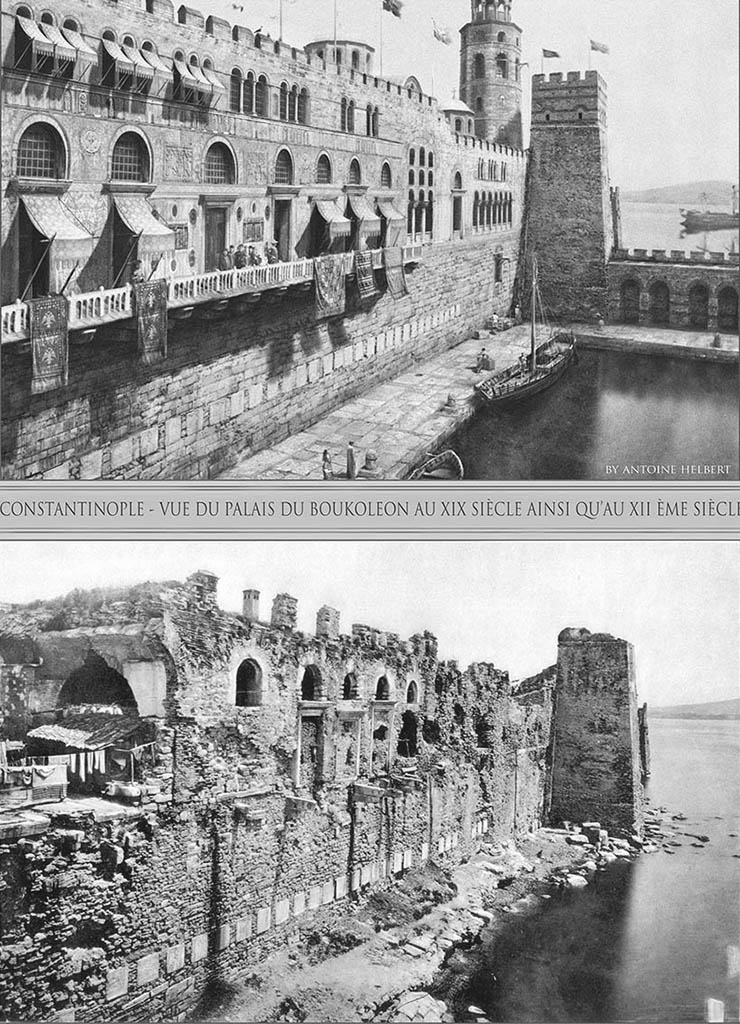 As soon as Theophano recovered she entered upon the struggle with Bringas. It seems, from the movements of Nicephorus, that the Empress was in communication with him before the death of Romanus, and that at least she sent him a secret and flattering message when Romanus died. Nicephorus had disbanded the army with which he had conducted two brilliant campaigns against the Saracens, and was little equipped to contest the power of Bringas, but he went at once to the city in order to be near Theophano. Bringas had made desperate efforts to keep him away, even going so far as to propose in the council that the general’s eyes should be put out for his treasonable ambition. His great victory over the Saracens and his repute for sanctity had, however, won a large body of admirers for Nicephorus, and when he entered the city in triumph, driving before his car groups of Saracen prisoners, and exhibiting the holy relics he had rescued from the hands of the heathen, citizens and soldiers and priests united in acclaiming him. A private conversation with the new patriarch Polyeuctes, a fanatical monk and eunuch, secured the favour of that prelate and his clergy, and it is even said that he ventured into the house of Bringas and revealed to that cautious statesman the hair shirt which he wore below his fine robes and the monastic heart that beat145 beneath it. But for his intense devotion to the young princes, he said, he would at once retire into a monastery.
As soon as Theophano recovered she entered upon the struggle with Bringas. It seems, from the movements of Nicephorus, that the Empress was in communication with him before the death of Romanus, and that at least she sent him a secret and flattering message when Romanus died. Nicephorus had disbanded the army with which he had conducted two brilliant campaigns against the Saracens, and was little equipped to contest the power of Bringas, but he went at once to the city in order to be near Theophano. Bringas had made desperate efforts to keep him away, even going so far as to propose in the council that the general’s eyes should be put out for his treasonable ambition. His great victory over the Saracens and his repute for sanctity had, however, won a large body of admirers for Nicephorus, and when he entered the city in triumph, driving before his car groups of Saracen prisoners, and exhibiting the holy relics he had rescued from the hands of the heathen, citizens and soldiers and priests united in acclaiming him. A private conversation with the new patriarch Polyeuctes, a fanatical monk and eunuch, secured the favour of that prelate and his clergy, and it is even said that he ventured into the house of Bringas and revealed to that cautious statesman the hair shirt which he wore below his fine robes and the monastic heart that beat145 beneath it. But for his intense devotion to the young princes, he said, he would at once retire into a monastery.
If we can believe this last statement, the situation was not without humour, because Bringas presently discovered that his pious rival was being surreptitiously admitted to the Empress’s apartments. Whether it is true or no that Nicephorus had previously been intimate with her, it is certain that he now became infatuated with Theophano, and received an assurance that she would marry him, if not more intimate pledges of her love. We may be confident that Theophano did not love him; he was not physically attractive to her sensual taste, and his incongruous mixture of piety and passion and deceit must have excited her disdain. He was merely the best instrument at hand for the achievement of her ambition. Then, as I said, Bringas discovered the secret meetings and renewed his attack. He invited Nicephorus to the palace. The gallant, but prudent, soldier preferred to fly to the altar of St Sophia and secure the protection of the patriarch. The Senate was convoked, the prelate warmly espoused the cause of Nicephorus, and he departed in honour to take supreme command of the army in Asia and await the orders of Theophano.
The next move of Bringas was a blunder and the beginning of his downfall. One of Nicephorus’s chief officers was his nephew, John Zimiskes, the later Emperor. When we find Zimiskes murdering his uncle with the aid of Theophano, and then callously repudiating her, we shall not suppose him to be a man of tender conscience, and Bringas, no doubt, regarded him as venal. He sent a secret messenger to offer Zimiskes the supreme command if he would send his uncle in bonds to Constantinople. Zimiskes calculated that he would have the command, in any case, if his uncle became Emperor, and he showed the letter to Nicephorus, and urged him to assume the purple. They were in Cæsarea at the time, and from that city Bringas soon learned that Nicephorus had accepted the title of Emperor and would march on Constantinople.
The spirited events which followed must here be told briefly. On Sunday morning, 9th August, the advance-guard of Nicephorus’s army appeared on the Asiatic shore in sight of the city, at the point where Scutari now is, and the people began to make their choice in the usual sanguinary way. The services in the great church were desecrated with riot, the battle against the guards who were faithful to Bringas was conducted in the streets, and by midnight the houses of his supporters were in flames. Theophano remained with her children behind the barrier of palace guards, listening, not unwillingly, to the increasing cries for Nicephorus. We may very well assume that she had had her share in the riot. One of the most formidable leaders of those who called for Nicephorus was the bold and ambitious Basil, the natural son of the elder Romanus. Castrated by his father, that he might never aspire to the purple, yet promoted to wealth and high office, he seems to have come to an agreement with Theophano. As soon as the battle began he led three thousand of his servants and followers, armed, into the Augusteum, and they continued all Sunday and throughout the night to hunt the soldiers of Bringas and loot the mansions of his friends.
Nicephorus had meantime reached the Hieria palace on the Asiatic side, and on the following Sunday he made his triumphant entry by the Golden Gate, and along the Mese, to St Sophia, the citizens draping their houses with the scarlet of rejoicing and adorning the way with laurel and myrtle. The patriarch Polyeuctes met him at the cathedral, and Theophano would be present on her golden throne, in her violet mourning robes, when the crown was put on his head.
 His next step must have caused a sensation in the city and entirely deceived the clergy. He sent a monk to conduct Theophano from the palace to the fortress, or higher prison, of Petrion on the Golden Horn, and147 maintained for a few weeks his austere aversion from wine and women. We hardly need the assurance of the chroniclers that this was done by arrangement between the two, and we may regard it as a device of Theophano. Nicephorus was now aflame like a youth. In the middle of September he “threw off the mask,” in the words of the ecclesiastical chronicler, and announced that he was to marry Theophano on 20th September. His monastic advisers, he explained, had concluded that his new position demanded that he should marry. The marriage service was performed by the patriarch himself in a chapel in the grounds of the palace, and, while the Emperor went to kiss the altars at St Sophia, Theophano retired to her familiar apartments, to congratulate herself on the fortunate issue of her difficult manœuvres.
His next step must have caused a sensation in the city and entirely deceived the clergy. He sent a monk to conduct Theophano from the palace to the fortress, or higher prison, of Petrion on the Golden Horn, and147 maintained for a few weeks his austere aversion from wine and women. We hardly need the assurance of the chroniclers that this was done by arrangement between the two, and we may regard it as a device of Theophano. Nicephorus was now aflame like a youth. In the middle of September he “threw off the mask,” in the words of the ecclesiastical chronicler, and announced that he was to marry Theophano on 20th September. His monastic advisers, he explained, had concluded that his new position demanded that he should marry. The marriage service was performed by the patriarch himself in a chapel in the grounds of the palace, and, while the Emperor went to kiss the altars at St Sophia, Theophano retired to her familiar apartments, to congratulate herself on the fortunate issue of her difficult manœuvres.
And presently the Emperor returned in terrible rage to tell her that a formidable obstacle had revealed itself. When he had reached the door of the sanctuary, the patriarch Polyeuctes had barred his way and said that he would be excluded from the church for a year for contracting a second marriage. His angry protest had availed nothing; before a vast crowd of his subjects he had had to submit to the austere priest, and he was to remain in the ignominious position of a penitent for a year. Concealing their anger, they concluded the day, as usual, with a banquet to the leading officers and nobles in the gold-roofed triclinon, now restored and magnificently decorated by Constantine, and retired to discuss Polyeuctes.
The patriarch was undoubtedly a stern and conscientious priest, insisting upon a plain law of his Church. We may, however, assume that another feeling mingled with his sense of discipline. Nicephorus had, in the literal meaning, tasted blood at his matrimonial banquet, and he passionately refused to forgo the embraces of Theophano. His pious practices were wholly discarded in a day, and the clergy must have been bitterly disappointed to see him passing from their allegiance to that of the beautiful adventuress. So Polyeuctes had made a bold bid for power; and he had made a serious mistake. From that moment Nicephorus conceived, not merely a personal hatred of the patriarch, but an anti-clerical spirit, and began to restrict the wealth and power of the priests and monks. He clung to his enchanting young bride and sternly faced the clergy. In the discussion that at once filled the palace and the city some careless noble, named Stylianus, had recalled the fact that Nicephorus was godfather to one of the Empress’s children, and the patriarch learned this. He at once pronounced that the marriage was invalid, as the Church regarded this spiritual relationship as an insuperable impediment to marriage, and bade the Emperor dismiss Theophano.
The feelings of Theophano during these days of disappointment and anxiety are left to our imagination. It is enough that her charms held Nicephorus to her in spite of the terrible threats of the patriarch, and it may be that it was she who approached the unfortunate Stylianus and persuaded him to commit perjury. Nicephorus gathered a council of pliant bishops and Senators, and they decided that, as the law invoked by the patriarch had been passed by the heretic Constantine Copronymus, it was not binding. Polyeuctes scorned their decision. Then Stylianus came forward to swear that Nicephorus had not been godfather to any child of Theophano, and the Emperor’s father, Bardas, came forward to swear that he was the godfather. The patriarch knew that they were lying, but his clergy were anxious to escape a formidable struggle and he was forced to yield. To Theophano it was, no doubt, immaterial whether or no she was married to Nicephorus; she had a strong and devoted soldier to protect her and her children. How the pious Nicephorus reconciled himself to the situation is one of the things that “God only knows.” All that we know is that the possession of Theophano dissipated his asceticism as the summer sun disperses the mists, and he eagerly embraced149 a woman to whom, under the creed of his Church, he was not married.
During the six years’ reign of Nicephorus the Empress had little occasion to assert her wayward personality, but it is significant that the one statement made of her is an accusation of crime. One of the sons of the older Romanus still languished in captivity, and it seemed possible, in view of the growing discontent at Constantinople, that an intrigue would be formed to put him on the throne. “Theophano,” we are curtly informed, “made an end of him.” There is no reason to doubt that messengers were sent to his distant prison with an order that he should be put to death, and it is more probable that the order came from Theophano than from Nicephorus. For the first year or two, however, Nicephorus prudently removed his fiery young bride from the seditious and immoral atmosphere of Constantinople, and she passed her days in unwonted innocence amid the lonely mountains of Cilicia.
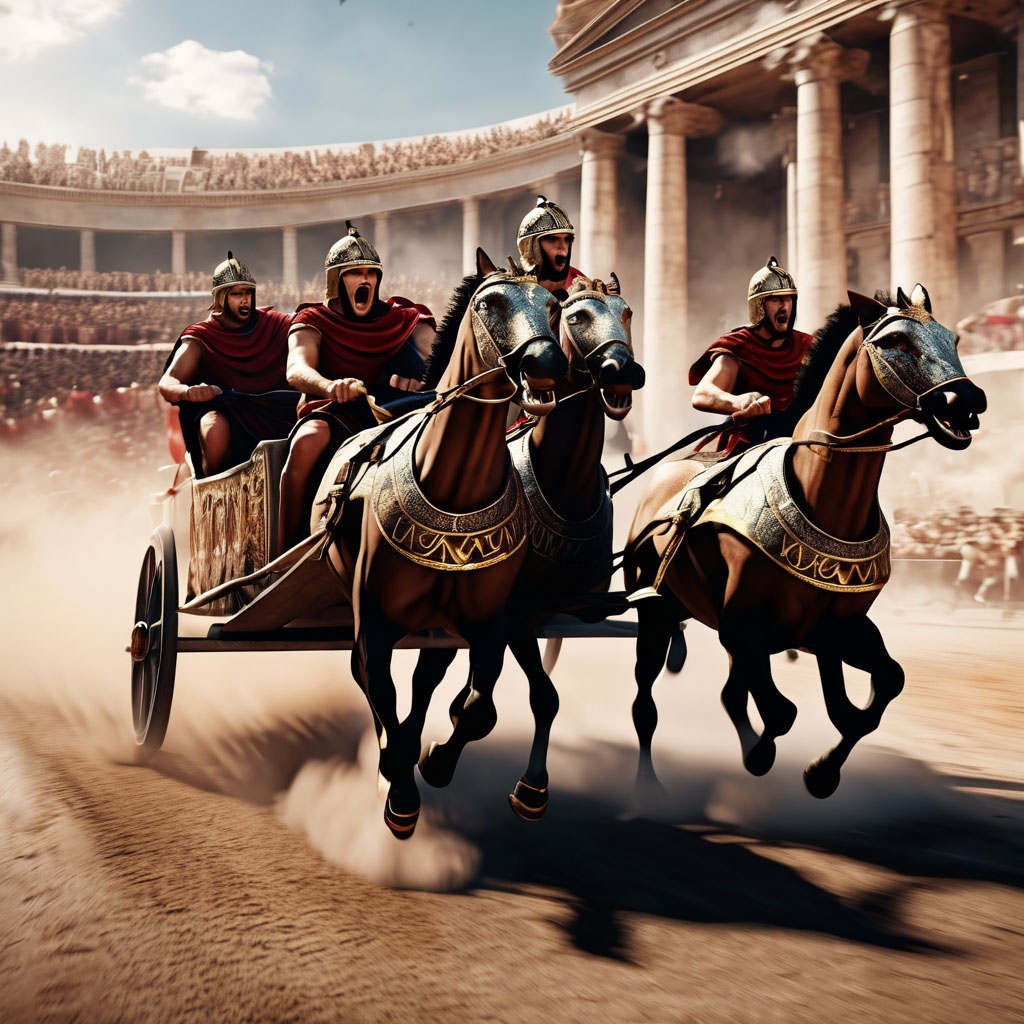 The Emperor had spent a few months in an effort, by lavish entertainment, to dispel the suspicion of parsimony and meanness under which he had ascended the throne. The Hippodrome rang daily with the applause and contests of the citizens, and the winter was enlivened with great gaiety. Meantime Nicephorus was gathering an immense army for the more substantial work of driving back the Saracens, and when, in the early spring, the cosmopolitan regiments were assembled along the Asiatic shore, he announced that the Empress would accompany him to the field. He knew Theophano too well to leave her in that world of intriguing eunuchs and ambitious courtiers. A little pot-bellied man, with dark skin and little dark eyes, with short greyish beard betraying his age, and with disproportionately long arms and short legs to his stumpy figure, he felt that he was not likely to grow fonder to the heart of the fascinating Theophano during two or three years’ absence. On the other hand, one must not imagine the sensual young Empress as being inconvenienced by the rough ways of150 a camp. The rulers of Constantinople carried their luxury even into the camp, on the occasions on which they condescended to take the field in person. Eighty horses were needed for the transport of the kitchen equipment and table silver alone, and thirty were required to convey the imperial wardrobe from town to town; while the whole countryside was laid under contribution to supply delicacies for the table. No doubt these normal glories of an imperial march would be at least doubled in view of the presence of Theophano.
The Emperor had spent a few months in an effort, by lavish entertainment, to dispel the suspicion of parsimony and meanness under which he had ascended the throne. The Hippodrome rang daily with the applause and contests of the citizens, and the winter was enlivened with great gaiety. Meantime Nicephorus was gathering an immense army for the more substantial work of driving back the Saracens, and when, in the early spring, the cosmopolitan regiments were assembled along the Asiatic shore, he announced that the Empress would accompany him to the field. He knew Theophano too well to leave her in that world of intriguing eunuchs and ambitious courtiers. A little pot-bellied man, with dark skin and little dark eyes, with short greyish beard betraying his age, and with disproportionately long arms and short legs to his stumpy figure, he felt that he was not likely to grow fonder to the heart of the fascinating Theophano during two or three years’ absence. On the other hand, one must not imagine the sensual young Empress as being inconvenienced by the rough ways of150 a camp. The rulers of Constantinople carried their luxury even into the camp, on the occasions on which they condescended to take the field in person. Eighty horses were needed for the transport of the kitchen equipment and table silver alone, and thirty were required to convey the imperial wardrobe from town to town; while the whole countryside was laid under contribution to supply delicacies for the table. No doubt these normal glories of an imperial march would be at least doubled in view of the presence of Theophano.
They sailed from the Bucoleon port in the great gold and purple galley of the imperial family, and joined the army at Cæsarea. From that city Theophano accompanied her husband across the hills and plains of Asia Minor until they came to the beginning of the Taurus range. Here the Emperor left Theophano and her sons, in safe charge, while he led his troops into the more dangerous country beyond. At the entrance of the narrow defile which the ancients knew as the “Cilician Gates” was the massive fortress of Drizibion, a solitary and rugged castle in a wild mountainous district. It was in this quiet and cool home, removed from communication with the metropolis, that Theophano and her children spent the summer of the year 964. She would, of course, have an ample retinue of eunuchs and women, and every provision would be made for her comfort, but, whether it was the jealousy or the amorousness of Nicephorus that detained her in this healthy solitude, she would be sure to resent it. At the beginning of the winter he returned to her, with modest laurels, and may have conducted her to Cæsarea, or some other city of the plains, for the enjoyment of the winter. But the early spring called him once more to the field, and it seems that Theophano had to spend another summer in the wilds of Cilicia. It was only in the autumn of 965 that she re-entered Constantinople, to witness the splendid triumph of her husband.
In the following year Nicephorus made another campaign, and from the time of his return in the autumn of 966 the shadow of tragedy began to creep over his life. His vast armies and laborious victories had laid a heavy burden of taxation on the Empire, and, passionately as Constantinople loved to see a herd of captives driven before the royal chariot in the hour of triumph, it was little disposed to pay for remote victories. The clergy also were embittered. Nicephorus, soured by the action of the patriarch, and thus made sensible of the revolting spread of luxurious idleness under the name of monasticism, curtailed the revenues of the clergy, forbade the further conversion of mansions and palaces into monasteries, and claimed the right to appoint bishops. The people became sullen and hostile. When, on Easter Sunday, 967, Nicephorus crossed the Augusteum to go to church, they pelted him with mud and stones so violently that a group of the more sober citizens had to rescue him. It was expected that he would inflict some punishment, and when, a few weeks later, he ordered his guards to descend to the arena in the Hippodrome and begin their military evolutions, either to impress or to entertain the spectators, there was a frantic rush for the gates and many were trodden underfoot.
By the summer of 969 life in the sacred palace had become very sombre and unpleasant, and Theophano began to seek a new companion. The ardour of her husband’s passion had been chilled by the terrors which now surrounded him, and, in preparation for the death which was foretold to him, he returned zealously to his monastic habits. Even the soldiers were now hostile to him, except his immediate corps of foreign mercenaries. Nicephorus relied on their formidable axes, converted the old and decaying Bucoleon palace into a massive fortress, girt the whole enclosure with a lofty castellated wall, and retired within this heavily guarded circle to spend his days and nights in prayer and penitence.
It is one of the most curious features of the story that, while he moodily punished his bravest officers for their very victories, the lithe and insidious Theophano retained his confidence. She had no longer the comparative solace of his sensual fire, and she must have looked on with deep disdain when he refused to share the imperial bed at night and, after long hours of prayer and psalm-reading, flung himself for a brief and feverish sleep on a panther-skin spread upon the ground in the corner of his chamber. But Theophano was not excluded from the Bucoleon palace, and she laid her plans to defeat his desperate entrenchments. The new partner whom she chose to encourage was the general Zimiskes, the Emperor’s nephew, whom we have seen on an earlier page revealing the perfidy of Bringas to his uncle. He had been dismissed from office by Nicephorus “on account of certain suspicions”; and we have little trouble in inferring that he was suspected of liaison with Theophano and eagerness for the throne. He was, like his uncle, a very little and robust man, but much more handsome than Nicephorus; his broad chest and great brawny arms were redeemed by a fair countenance, a pair of keen and friendly blue eyes and a crown of almost golden hair. I must be pardoned for inserting such portraits of the Emperors as we have, while seeming to omit the more desirable portraits of their consorts. The Byzantine chroniclers rarely give us more than the very vaguest assurances that Empresses were “very beautiful,” and so on, and the few surviving representations of them in ivory or bronze or mosaic are not portraits on which one would dare to found a physiognomical study.
In the autumn of 969 Zimiskes was living impatiently on his private estate in Armenia, when he received an assurance that Theophano had persuaded his uncle to allow him to return to Court. Whether or no it is true that he had previously enjoyed the favours of Theophano, he now certainly became her ally and accomplice. She seems to have deluded Nicephorus with diabolical duplicity. A rumour, which most historians plausibly ascribe to her, was circulated in Constantinople, to the effect that Nicephorus intended to castrate her sons and leave the crown to his brother Leo, who, on account of his extortions, was no less hated than he. On the other hand, Theophano persuaded Nicephorus that the interest of herself and her children would be best consulted if Zimiskes were recalled to the capital and compelled to marry some noble lady of the city. Nicephorus assented, and his nephew came to Constantinople. Then it seems to have been betrayed to the Emperor, probably by his brother, that Zimiskes was being secretly admitted to the Empress’s apartments, and he placed restrictions on him. Zimiskes retired to his mansion at Chalcedon, on the Asiatic side, and continued to communicate with Theophano.
The culmination of the plot is a thrilling, if sordid, page of romance. On the night of 10th December Theophano visited her husband and persuaded him to leave his chamber door unfastened, as she would see him later. He still failed to suspect her, although some watchful priest had warned him of the plot. Some time before a group of tall, veiled women had presented themselves at the palace door and been admitted; and, when they had reached the secret chambers assigned to them by Theophano, it was a group of bronzed soldiers who emerged from the mantles and veils. Someone betrayed them, and Nicephorus sent an officer to explore the palace, but he, probably being in the pay of Theophano, reported that all was well, and Nicephorus turned to his long psalms. Theophano and her servants were in the upper part of the palace looking out anxiously over the Sea of Marmora. It was a dark wintry night, and the snow was falling heavily. At length a faint whistle from below told them that a boat had arrived from Chalcedon and lay under the walls. A basket (some say a ladder) was tied to a rope and lowered into the depths, and presently Zimiskes and several companions were within the palace. An Arab historian would have us believe that Theophano herself led them, with drawn swords, to her husband’s room; it is more probable that, as the Greek writers say, she left this to one of her eunuchs.
For a moment the conspirators started back in alarm; the imperial bed was empty, and they fancied that the plot was known, and Nicephorus would fall on them. But the eunuch showed them the sleeping form of the Emperor on his panther-rug, and, with a cry for help to the Virgin, the strange soldier-monk passed out of the imperial world he had invaded. Basil, the astute head chamberlain, had an opportune illness at the moment, and only recovered in time to do reverence to his new sovereign. The guards alone rushed from their quarters and attacked the conspirators, but the sight of the grisly head of the late Emperor, which was exhibited at the window, induced them to sheathe their swords and accept a new paymaster. So Zimiskes proceeded gaily to the golden palace (Chrysotriclinon) to put on the purple slippers, and Theophano retired to her room to reflect on the next phase of her career: perhaps to glance now and again at the ghastly trunk of her late husband, which lay, all night and all the following day, in the snow without. This, surely, was the last crime she need commit. She was still young, and might look forward to many years of power with the robust soldier she had invited to share her throne.
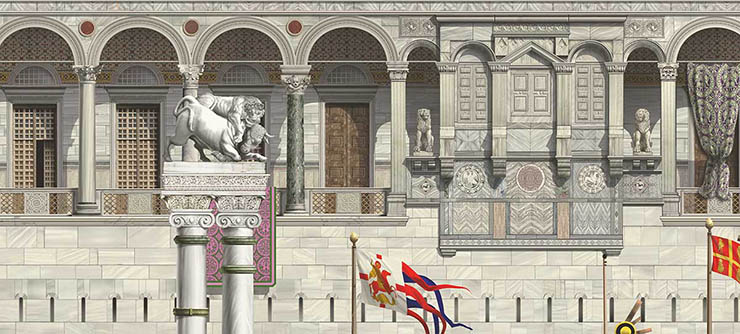 Six days later Zimiskes went in state to St Sophia to receive his diadem, and found the stern patriarch Polyeuctes again boldly barring the way. He refused to crown Zimiskes except on three conditions: he must undo the anti-clerical work of his predecessor, he must deliver to justice the actual murderer of Nicephorus, and he must drive the guilty Theophano from the palace. Theophano now discovered the full brutality of her accomplice. He bowed at once to the commands of the patriarch, and the beautiful young Empress—she must still have been in her twenties, unless she was much older than her husband at the time of her first marriage—was dragged from her apartments to the Bucoleon quay and155 shipped to one of the dreary island prisons in the Sea of Marmora. She was furious with rage and disappointment. After a time she escaped and contrived to reach the altar in St Sophia; but even the mob of Constantinople shrank from the murderess, and her former confederate, Basil, was allowed to tear her from the altar. In her frenzy she beat the grand chamberlain with her own white hands and, reverting to the language of the tavern, poured her invectives on the “Scythian bastard.” Her career had been so darkened with suspicion, and had so plainly ended in murder, that her appeals fell on a cold, if not jeering, audience, and she was conveyed to distant Armenia and confined in a monastery.
Six days later Zimiskes went in state to St Sophia to receive his diadem, and found the stern patriarch Polyeuctes again boldly barring the way. He refused to crown Zimiskes except on three conditions: he must undo the anti-clerical work of his predecessor, he must deliver to justice the actual murderer of Nicephorus, and he must drive the guilty Theophano from the palace. Theophano now discovered the full brutality of her accomplice. He bowed at once to the commands of the patriarch, and the beautiful young Empress—she must still have been in her twenties, unless she was much older than her husband at the time of her first marriage—was dragged from her apartments to the Bucoleon quay and155 shipped to one of the dreary island prisons in the Sea of Marmora. She was furious with rage and disappointment. After a time she escaped and contrived to reach the altar in St Sophia; but even the mob of Constantinople shrank from the murderess, and her former confederate, Basil, was allowed to tear her from the altar. In her frenzy she beat the grand chamberlain with her own white hands and, reverting to the language of the tavern, poured her invectives on the “Scythian bastard.” Her career had been so darkened with suspicion, and had so plainly ended in murder, that her appeals fell on a cold, if not jeering, audience, and she was conveyed to distant Armenia and confined in a monastery.
The rest of the story of Theophano, as far as it is known to us, is told in the curt statement that she was recalled to Court in the reign of her eldest son, Basil, and again enjoyed the imperial position for half-a-century. John Zimiskes retained only for a few years the power for which he had paid so base a price. The marriage which he presently contracted was not much less sordid than the marriage he had intended to contract; if, indeed, he ever had a serious desire to make so dangerous a woman as Theophano the partner of his throne. He took a nun from her monastery, bade the patriarch—whose scruples had their limits—relieve her of her vows, and married her. The Empress Theodora is not clearly outlined in the chronicles, but she is not without interest. She was one of those daughters of Constantine whom her brother Romanus had forced to take the veil. Zimiskes had felt that an alliance with the late dynasty would strengthen his position, and it may be remembered that the daughters of Constantine were not at all scrupulous. They had refused to wear the black robe or eat the bread and beans of the monastery.156 Constantinople is said to have indulged in the most boisterous rejoicing over the marriage, and even the heavens seemed to express their satisfaction, when one of the Senators discovered in his orchard an ancient stone on which was miraculously inscribed: “Long Life to John and Theodora.” There were, however, sceptics in the city, as it was recalled that a similar “discovery” had been made in the interest of Irene and her son, yet the blessing had proved illusory. The Senator was richly rewarded, but he may have lived to see the futility of his miracle. After a few years (976) the handsome chamberlain Basil bribed John’s cook to put less innocent things than condiments in his dishes, and he went the beaten way of Byzantine Emperors. Theodora disappears after his death, though we can hardly suppose that she returned to her monastery.
Theophano’s sons, Basil and Constantine, now became joint Emperors, and they recalled their mother from Armenia to the palace. One would be inclined to suspect that the poisoning did not come to her as a surprise, but the chroniclers do not impeach her, and we need not strive to lengthen the list of her misdeeds. She makes no further mark, for good or evil, in the chronicles. Possibly the terrible experiences of her early womanhood and seven years of sober reflection in her monastic prison had destroyed her passion for intrigue. In any case, the very vigorous administration of her elder son left her little room to interfere, and she seems to have been content with the quiet enjoyment of the position of a dowager Empress. According to George the Monk (or his continuer) she lived for fifty years after the death of her first husband—that is to say, after 963—and so she must have passed her seventieth year at the time of her death. There seems to have been no rival Empress during that time. We may trust that the character of Theophano sobered and matured, and that the forty years’ silence means that she led a regular and unambitious life. However that may be, the personality she shows when she is under the full limelight on the imperial stage is one of unrestrained passion and greed. She was a tavern-keeper’s daughter in the purple, an appalling instance of the lowest type of Greek beauty.
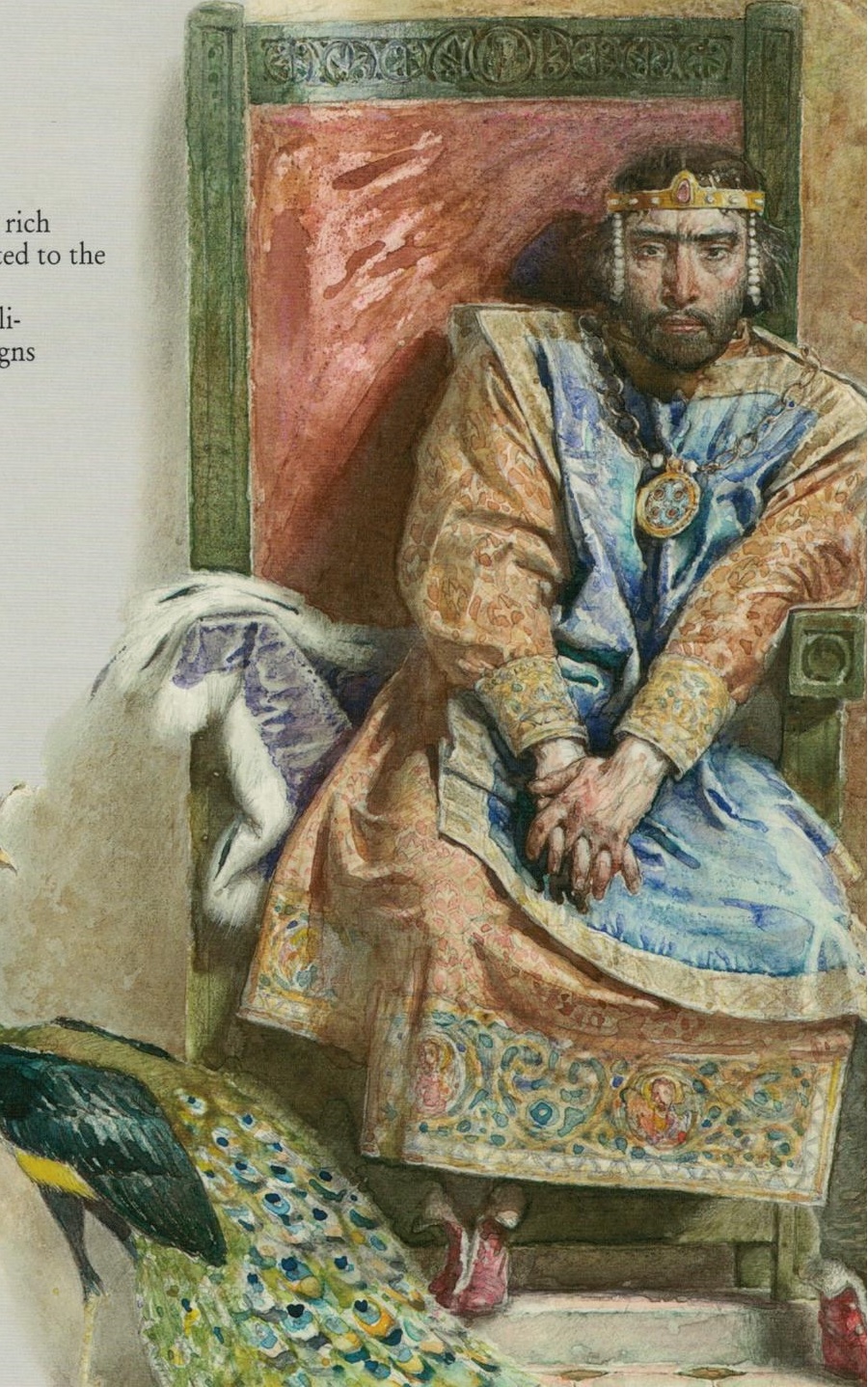 Emperor John I Tzimiskes, the murderer of his uncle Nikephorus II Phocas in his bed in the Boukoleon Palace. John married his uncle's wife, who was his co-conspirator in the assassination.
Emperor John I Tzimiskes, the murderer of his uncle Nikephorus II Phocas in his bed in the Boukoleon Palace. John married his uncle's wife, who was his co-conspirator in the assassination.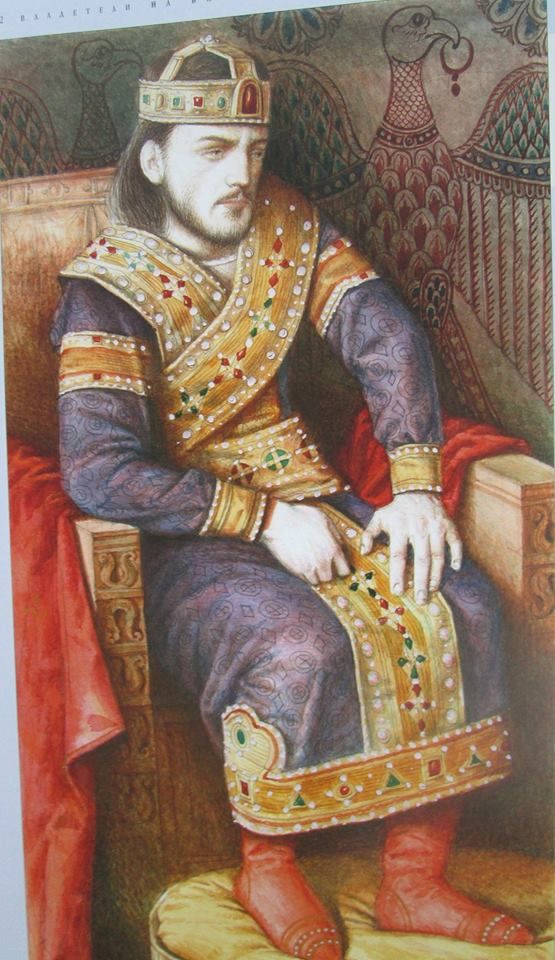
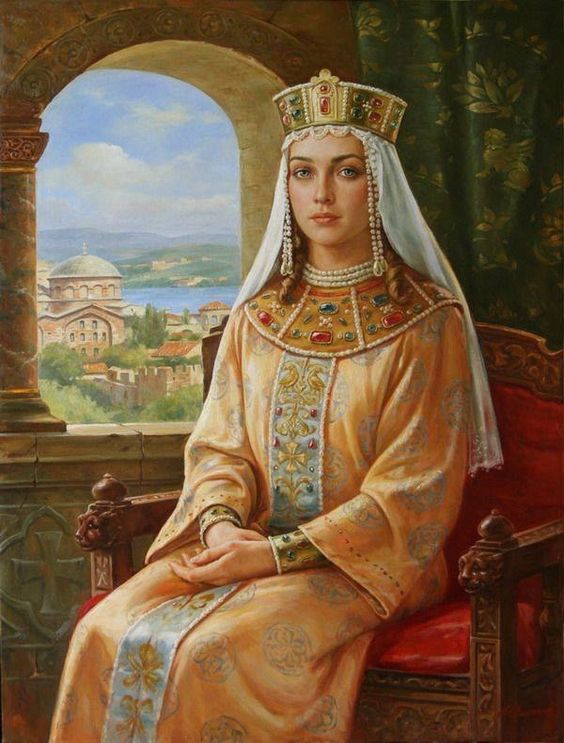
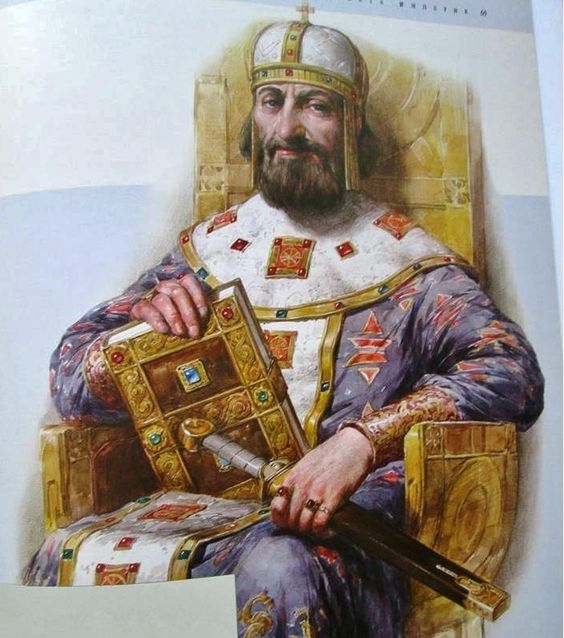
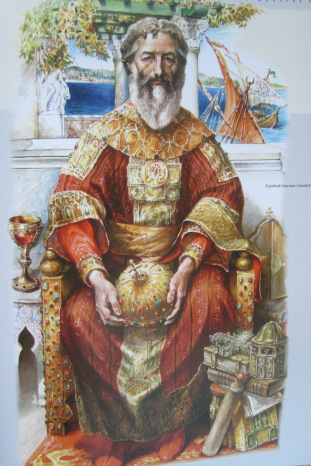
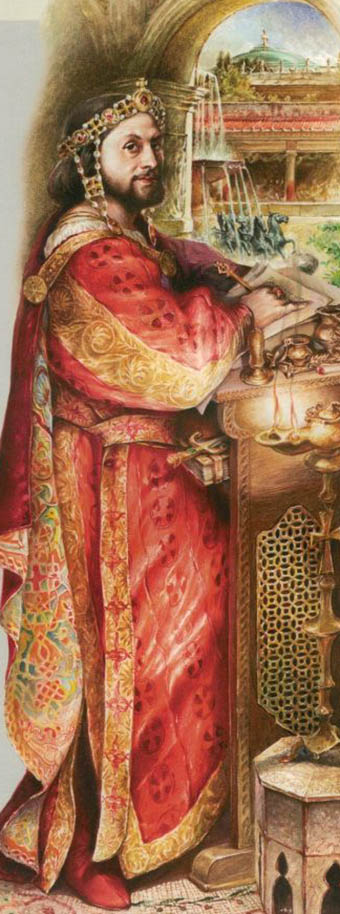

 As soon as Theophano recovered she entered upon the struggle with Bringas. It seems, from the movements of Nicephorus, that the Empress was in communication with him before the death of Romanus, and that at least she sent him a secret and flattering message when Romanus died. Nicephorus had disbanded the army with which he had conducted two brilliant campaigns against the Saracens, and was little equipped to contest the power of Bringas, but he went at once to the city in order to be near Theophano. Bringas had made desperate efforts to keep him away, even going so far as to propose in the council that the general’s eyes should be put out for his treasonable ambition. His great victory over the Saracens and his repute for sanctity had, however, won a large body of admirers for Nicephorus, and when he entered the city in triumph, driving before his car groups of Saracen prisoners, and exhibiting the holy relics he had rescued from the hands of the heathen, citizens and soldiers and priests united in acclaiming him. A private conversation with the new patriarch Polyeuctes, a fanatical monk and eunuch, secured the favour of that prelate and his clergy, and it is even said that he ventured into the house of Bringas and revealed to that cautious statesman the hair shirt which he wore below his fine robes and the monastic heart that beat
As soon as Theophano recovered she entered upon the struggle with Bringas. It seems, from the movements of Nicephorus, that the Empress was in communication with him before the death of Romanus, and that at least she sent him a secret and flattering message when Romanus died. Nicephorus had disbanded the army with which he had conducted two brilliant campaigns against the Saracens, and was little equipped to contest the power of Bringas, but he went at once to the city in order to be near Theophano. Bringas had made desperate efforts to keep him away, even going so far as to propose in the council that the general’s eyes should be put out for his treasonable ambition. His great victory over the Saracens and his repute for sanctity had, however, won a large body of admirers for Nicephorus, and when he entered the city in triumph, driving before his car groups of Saracen prisoners, and exhibiting the holy relics he had rescued from the hands of the heathen, citizens and soldiers and priests united in acclaiming him. A private conversation with the new patriarch Polyeuctes, a fanatical monk and eunuch, secured the favour of that prelate and his clergy, and it is even said that he ventured into the house of Bringas and revealed to that cautious statesman the hair shirt which he wore below his fine robes and the monastic heart that beat His next step must have caused a sensation in the city and entirely deceived the clergy. He sent a monk to conduct Theophano from the palace to the fortress, or higher prison, of Petrion on the Golden Horn, and
His next step must have caused a sensation in the city and entirely deceived the clergy. He sent a monk to conduct Theophano from the palace to the fortress, or higher prison, of Petrion on the Golden Horn, and The Emperor had spent a few months in an effort, by lavish entertainment, to dispel the suspicion of parsimony and meanness under which he had ascended the throne. The Hippodrome rang daily with the applause and contests of the citizens, and the winter was enlivened with great gaiety. Meantime Nicephorus was gathering an immense army for the more substantial work of driving back the Saracens, and when, in the early spring, the cosmopolitan regiments were assembled along the Asiatic shore, he announced that the Empress would accompany him to the field. He knew Theophano too well to leave her in that world of intriguing eunuchs and ambitious courtiers. A little pot-bellied man, with dark skin and little dark eyes, with short greyish beard betraying his age, and with disproportionately long arms and short legs to his stumpy figure, he felt that he was not likely to grow fonder to the heart of the fascinating Theophano during two or three years’ absence. On the other hand, one must not imagine the sensual young Empress as being inconvenienced by the rough ways of
The Emperor had spent a few months in an effort, by lavish entertainment, to dispel the suspicion of parsimony and meanness under which he had ascended the throne. The Hippodrome rang daily with the applause and contests of the citizens, and the winter was enlivened with great gaiety. Meantime Nicephorus was gathering an immense army for the more substantial work of driving back the Saracens, and when, in the early spring, the cosmopolitan regiments were assembled along the Asiatic shore, he announced that the Empress would accompany him to the field. He knew Theophano too well to leave her in that world of intriguing eunuchs and ambitious courtiers. A little pot-bellied man, with dark skin and little dark eyes, with short greyish beard betraying his age, and with disproportionately long arms and short legs to his stumpy figure, he felt that he was not likely to grow fonder to the heart of the fascinating Theophano during two or three years’ absence. On the other hand, one must not imagine the sensual young Empress as being inconvenienced by the rough ways of Six days later Zimiskes went in state to St Sophia to receive his diadem, and found the stern patriarch Polyeuctes again boldly barring the way. He refused to crown Zimiskes except on three conditions: he must undo the anti-clerical work of his predecessor, he must deliver to justice the actual murderer of Nicephorus, and he must drive the guilty Theophano from the palace. Theophano now discovered the full brutality of her accomplice. He bowed at once to the commands of the patriarch, and the beautiful young Empress—she must still have been in her twenties, unless she was much older than her husband at the time of her first marriage—was dragged from her apartments to the Bucoleon quay and
Six days later Zimiskes went in state to St Sophia to receive his diadem, and found the stern patriarch Polyeuctes again boldly barring the way. He refused to crown Zimiskes except on three conditions: he must undo the anti-clerical work of his predecessor, he must deliver to justice the actual murderer of Nicephorus, and he must drive the guilty Theophano from the palace. Theophano now discovered the full brutality of her accomplice. He bowed at once to the commands of the patriarch, and the beautiful young Empress—she must still have been in her twenties, unless she was much older than her husband at the time of her first marriage—was dragged from her apartments to the Bucoleon quay and



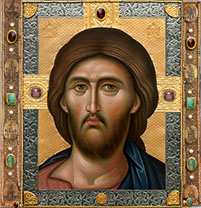 click here for icons of christ
click here for icons of christ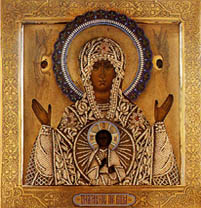 click here for icons of the theotokos
click here for icons of the theotokos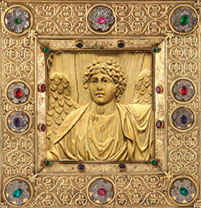 click here for icons of angels
click here for icons of angels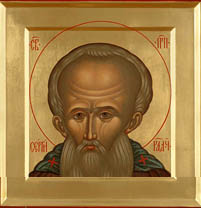 click here for icons of saints
click here for icons of saints








